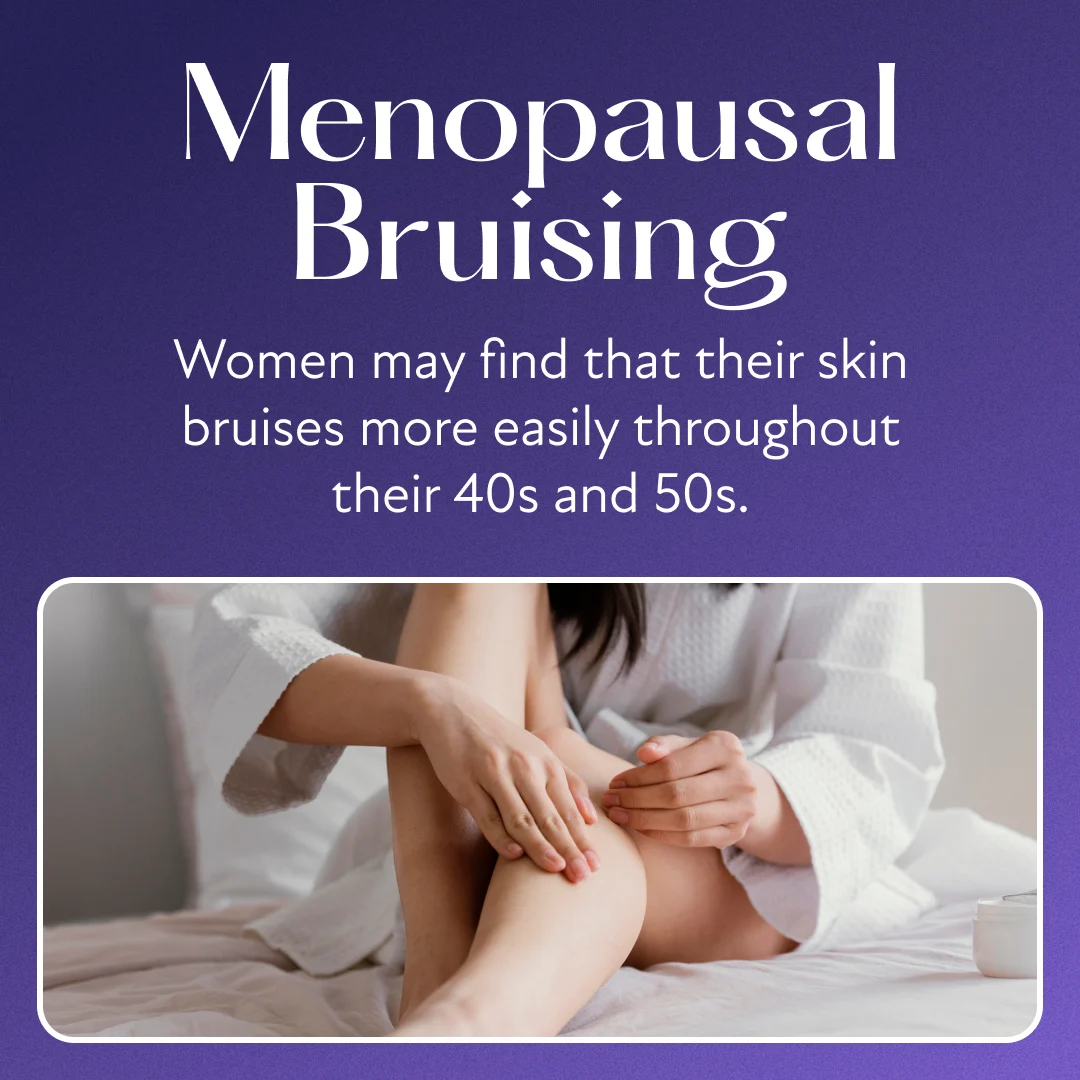Wrinkles, dryness, and sagging are common skin changes that occur during menopause. Many postmenopausal women also report that they experience increased bruising during this stage of life.(1) A bruise develops when blood vessels suffer damage from physical trauma, causing blood to leak and pool beneath the skin’s surface. Bruises are categorized based on the severity of the damage. Most people have experienced subcutaneous bruises, which occur just below the skin. Intramuscular bruises occur deep within the muscle, while periosteal bruises affect the bone.(2)
Changes in hormone levels during menopause can increase the risk of bruising. Other common menopausal symptoms may also be contributing factors. This article will explore why bruising occurs more easily during menopause and examine whether menopause can cause unexplained bruising. Understanding how the skin’s structure changes during this phase of life can help women protect their skin from injury.
When does menopausal bruising occur?
Most women begin experiencing symptoms of menopause between the ages of 45 and 55, with menopause typically occurring around the average age of 52.(3) During this time, hormone fluctuations cause the skin to thin, increasing the risk of bruising.(4) Women may find that their skin bruises more easily throughout their 40s and 50s.

What causes bruising during menopause?
Bruising during menopause is influenced by drops in estrogen levels.(4) Beginning in perimenopause, the expression of estrogen receptors in the skin decreases. There is also a clear connection between collagen levels in the skin and estrogen levels in the body. Declining estrogen levels can decrease collagen production, reduce skin thickness, and result in a loss of moisture. Changes in elastin fibers, which give skin its flexibility, also occur. All of these factors cause the skin to become dry and thin, leaving it more susceptible to damage and injury as women age.(5)
Other menopausal symptoms that women commonly experience during midlife may also contribute to bruising. For instance, dizziness can increase susceptibility to bruising if it causes a loss of balance and falls. Sleep disruptions from night sweats are another frequent issue during menopause. Inadequate sleep can cause daytime grogginess, potentially increasing the risk of injury.
Changes in hormone levels during menopause may also cause vision issues, as sex steroid hormones affect the physiology of the eyes’ surface tissue. Dry eye (DE) is a condition commonly seen in females over 50, and some research suggests that menopausal women may be more vulnerable to it. Blurry vision, a symptom of dry eye, may increase the risk of bruising if it leads to stumbling due to vision impairment.(6)(7)
Symptoms of Menopausal Bruising
Bruises that develop during menopause are not distinctly different from those incurred at other stages of life. However, they may occur more easily. Women may experience the following symptoms of bruising:(2)
Skin discoloration
Swelling
Pain
Tenderness
Difficulty using the affected muscle if it’s an intramuscular bruise
Prevention and Treatment for Menopause Bruising
Minor bruises are generally not a cause for concern and typically do not require treatment. Mild subcutaneous bruises usually resolve within an average of two weeks, although the healing process may be slower for older adults.(8)(9) Depending on the severity, it may take months for a bruise to completely fade.(2) Changes in color are a sign that the injury is healing, with bruises typically going from a pink or red tint to shades of blue or purple, then to green or yellow before it fully resolves. If swelling occurs, applying a cold compress to the affected area can reduce inflammation and accelerate healing.(2)
When it comes to prevention, addressing skin thinning is one way to reduce the risk of bruising during menopause. Using sunscreen with a sun protection factor (SPF) of 30 or higher on a daily basis can help prevent thinning in areas of exposed skin. In some cases, a dermatologist may recommend laser therapy or skincare products containing retinoids.(4) A doctor may also suggest bioidentical hormone replacement therapy (HRT).
In addition to managing skin changes, HRT can also address other common menopausal symptoms by restoring balance to changing hormone levels. Increasing low hormone levels that may be contributing to symptoms like dizziness or sleep disruptions may help reduce the risk of injury and subsequent bruising.
Maintaining a nutrient-rich diet and engaging in aerobic, muscle-strengthening, and balance exercises are also effective preventive measures women can take. These exercises enhance muscle strength, flexibility, and balance, thereby lowering the chances of bruising from falls or other physical trauma.
When to See a Doctor for Menopausal Bruising
Natural aging, genetics, medication use, and certain health conditions can also play a role in how easily a person bruises. Therefore, if women notice bruising that cannot be explained by injury, particularly in areas of unexposed skin, they should consult with a healthcare provider to determine the cause. While hormonal changes during menopause may affect bruising tendencies, they do not typically cause unexplained bruising.(9)
Changes in the location of bruises or an increase in bruising frequency can potentially indicate a health condition, like liver issues, cancer, or certain blood disorders.(10) Women should also contact their healthcare provider if they suspect a bruise may be infected. Urgent medical care may be necessary if bruises are large or excessively painful.
Women should speak with a doctor if they are considering HRT to address skin changes during menopause. These changes may be contributing to bruising, and HRT can help by increasing the skin’s elasticity and thickness, boosting collagen production, and minimizing wrinkles.(11)
Noticing more bruising during menopause? Discover if HRT is right for you.
If you’ve entered the menopause transition and are dealing with menopausal bruises, you’re not alone. Take our brief menopause quiz to see if you’re an eligible candidate for HRT. Get started with Winona to take the first step toward feeling better.